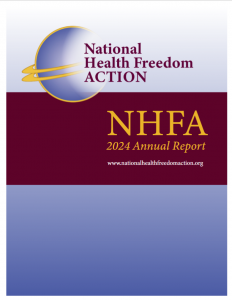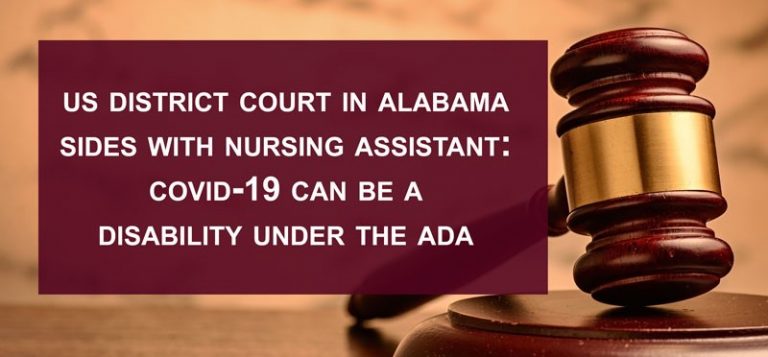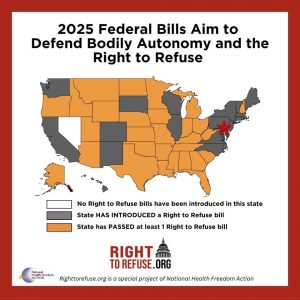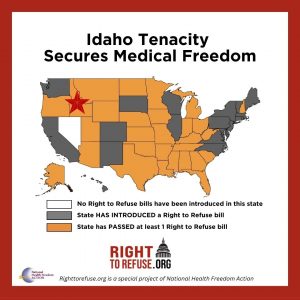

The Americans with Disabilities Act (ADA) has given rise to claims for some individuals with COVID-19. According to Judge Huffaker of the US District Court of Alabama, this case is, “at the intersection of COVID-19 and the ADA.” Questions to be considered are whether COVID-19 can be considered a disability under the ADA, and if so, has Ms. Brown made allegations which show a COVID-19 related disability?
Lucious Brown v. Roanoke Rehabilitation & Healthcare Center, et al.
Back in the summer of 2020, Lucious Brown was fired from her position as a certified nursing assistant at the Roanoke Rehabilitation & Healthcare Center in Alabama. This termination was partly based on a catch-22: her employer mandated a 14-day COVID-19 quarantine, and she was on the 13th day of this quarantine when she was fired. Ms. Brown sued in the US District Court in Alabama, and on April 22 Judge Austin Huffaker, Jr issued an order denying a request by Roanoke Rehabilitation to dismiss the case and determining that if the facts alleged by Ms. Brown are correct, she has a valid claim under the ADA.
Severe Weakness, Difficulty Breathing
During her 13th day of isolation, Brown was experiencing, “severe weakness, fatigue, brain fog, high blood pressure, cough, difficulty breathing, fever, and swollen eyes, all of which she alleges were caused by COVID-19.” Ms. Brown’s lawsuit alleged an ADA violation, disability discrimination, and the Alabama tort of “outrage.” The Roanoke Center sought dismissal of the ADA claims, and early in his opinion Huffaker concludes that this motion will be denied.
Ms. Brown Under 14-Day Isolation
Brown worked for Roanoke from September 16, 2019 to July 13, 2020. On June 29, 2020, experiencing symptoms. She went to her doctor for a COVID-19 test, and was told to self-isolate until the results were in. On July 1 the test came back positive. In July of 2020 Roanoke had a policy requiring a 14-day isolation period for employees with a positive COVID-19 test, consistent with CDC guidelines. “With the July 1 positive test, in compliance with the Defendants’ policy and the CDC guidelines, Brown was to isolate until July 14, 2020,” notes Judge Huffaker.
Roanoke Directs Ms. Brown to Report to Work
In spite of the 14-day rule, on July 7, 2020 Brown’s supervisor called her and told her she has “to report to work to be tested again for COVID-19.” Ms. Brown replied that she was under isolation as ordered and that she was still having the same symptoms. On July 10, once again the supervisor told Brown she had to report to work for testing. And again, Brown told her that she, “was still suffering from COVID-19 symptoms.” Brown stayed in isolation and did not report in for the COVID-19 testing.
Fired on Day 13 of 14-Day Isolation
The next day, Brown got a third call from her supervisor. The latter told Brown that she must report to work on July 13 or Roanoke would find that she had “voluntarily” quit her job. Brown, still suffering from “severe weakness, fatigue, brain fog, high blood pressure, cough, difficulty breathing, fever, and swollen eyes,” did not report to work on the 13th. That day, the 13th day of Brown’s 14-day isolation period, she was terminated from her job. On the 14th, Brown’s doctor retested her and she again tested positive for COVID-19. She filed her lawsuit on September 3, 2021. In ruling on Roanoke’s motion to dismiss, the judge noted that a legal complaint needs, “only enough facts to state a claim to relief that is plausible on its face.”
Accommodation of Temporary Leave Denied
In her ADA claim, Brown said that either she suffered from a disability or was regarded as being in such a condition due to her severe case of COVID-19, that she had requested the reasonable accommodation of a temporary leave from work, and that such accommodation is required by the ADA. The accommodation request was denied, and Ms. Brown, “was terminated following her third refusal to return to work despite still experiencing symptoms and following an isolation protocol.” Key facts needed to state a case of ADA discrimination are that one has a disability, that the person is qualified for the job, and that the employer discriminated against the person because of the disability.
Is Brown Disabled Under the ADA?
The only issue being disputed by the Roanoke Center is whether or not Brown was disabled and/or regarded as being disabled within the meaning of the ADA. Roanoke argued that, “a positive COVID-19 test and the symptoms Brown alleges are not sufficient to show that she was disabled under the meaning of the ADA, or that she was regarded as disabled.” “Disability” means a physical or mental impairment which substantially limits on or more major life activities, a record of such impairment, or “being regarded as having such an impairment.”
Sufficient Facts to Allege Physical or Mental Impairment
Ms. Brown alleges that the symptoms she was suffering, combined with CDC and Roanoke policy which both called for a 14-day isolation, shows that she had an “actual disability.” Major life activities include, “caring for oneself, performing manual tasks, seeing, hearing, eating, sleeping, walking, standing, lifting, bending, speaking, breathing, learning, reading, concentrating, thinking, communicating, and working.” And while Roanoke argued that Brown had not shown that her symptoms affected a “major life activity,” the judge concluded that, “Brown has presented sufficient facts to allege that she had physical or mental impairments from COVID- 19 and that those impairments substantially limited recognized major life activities.”
DHHS and Department of Justice Guidance
Judge Huffaker notes that guidance from the Department of Health and Human Services along with the Department of Justice indicate that some forms of COVID-19 may be considered a disability for ADA purposes. The guidance noted that this ailment, “is a physiological condition affecting one or more body systems.” So, COVID can be a physical or mental impairment. It also says that some cases of the disease can substantially limit major life activities, “such as one’s respiratory function, gastrointestinal function, and brain function, even months after first being infected.”
Prior Legal Cases Distinguished
Roanoke argued that prior legal cases show that COVID-19 is not an ADA disability. But Judge Huffaker says that these cases can easily be distinguished from Brown’s case because the prior plaintiffs failed to allege any symptoms and simply relied on a COVID-19 diagnosis. The judge also opines that at this stage of the case, he is assuming the truth of Ms. Brown’s claims, but he notes that after evidence has been further developed in the case, Roanoke can try again for dismissal under a summary judgement. And while conceding Roanoke’s point that an accommodation denial claim requires an actual disability, Huffaker notes that Brown also alleged discrimination based on disability and that in that context, being regarded as having a disability can give a basis to sue.
RECENT NEWS



One hundred Days of Making America Healthy Again
May 15, 2025

Idaho Tenacity Secures Medical Freedom
May 12, 2025
